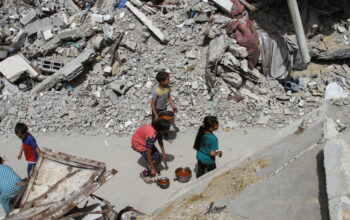
PARIS — In his first televised interview since his re-election, President Emmanuel Macron of France adopted a combative tone on Thursday in trying to reassure the French that he was firmly at the wheel to address challenges ranging from inflation to climate change.
Following a laborious start to his second term that had fueled worries that listlessness was gripping the presidency, Mr. Macron rejected the idea that the country was headed for five years of “immobilism” after he lost his absolute majority last month in the lower house of Parliament.
“Not at all,” he said, before smiling at the two journalists from the TF1 and France 2 television channels who were interviewing him on the Élysée Palace’s lawn, and adding: “You haven’t heard what I’ve been saying for the past hour!”
Mr. Macron, appearing energetic, had said a lot — on French military spending and rising inflation in the context of the war in Ukraine, on the need to tackle climate change as France tries to cope with wildfires and a sweltering heat wave, and on his vow to reform the French labor market and pension system.
“I want the country to move forward,” Mr. Macron said in the Bastille Day interview. “I will do everything to find intelligent compromises along that course.”
Since taking office in 2017, Mr. Macron had broken with the widely observed presidential tradition of Bastille Day televised interviews, giving only one previously, in 2020, at the height of the Covid-19 pandemic.
His decision to return to tradition on Thursday suggested he was eager to shore up support and to give France a sense of direction that had been lacking over the past few months.
One survey published this week by the Ifop polling institute found that his approval rating, which has declined since his election, was at 37 percent, his lowest since the start of the pandemic.
Mr. Macron convincingly defeated Marine Le Pen, the far-right leader, to win a second term in April, but a poor performance by his party and his center-right allies in the parliamentary elections, attributed by some analysts partly to his lack of involvement in the campaign, raised questions about his ability to govern.
Mr. Macron added to concerns that he was adrift when he belatedly appointed a new prime minister and a new government, only to tweak his cabinet again earlier this month, seeking a fresh start that seemed to elude him as a string of international summits and diplomatic overtures to stop fighting in Ukraine kept him away from France.
Mr. Macron said on Thursday that he was confident that his government could find compromise and pass legislation, arguing that only a “baroque combination” of parties that are “completely opposed to each other” — a left-wing coalition, Ms. Le Pen’s far-right party, and mainstream conservatives — could muster enough votes to thwart him.
But that was precisely what happened this week, when opposition lawmakers rejected a proposal giving the government the ability to reinstate Covid-19 health passes at France’s borders.
The bill is not final — it will go to the Senate and can still be tweaked — but the developments were a worrying setback for the government, and an ominous sign as it hopes to pass a bill on purchasing power over the summer.
Mr. Macron’s interview came after a Bastille Day military parade in Paris that opened with the presentation of the flags of guest countries, most of them Eastern European allies like Estonia, Poland and Romania, and was followed by troops representing French forces currently deployed on NATO’s eastern flank.
“This war is going to last, but France will always be in a position to help Ukraine,” Mr. Macron said, as he accused Russia of wielding energy as a weapon and said that there was a “likely risk” that the country would cut gas flows to Europe.
“It’s a very difficult scenario and we must prepare for it,” he added, although he noted that France, which draws about 70 percent of its electricity from nuclear power, was not as dependent on Russian gas as some of its neighbors.
Mr. Macron warned that the economic impact of the war would become more acute in the fall and the winter, and he said the government would draw up plans to save energy.
But he also said that his reformist zeal was intact, announcing that the government would work on reforming France’s unemployment system in the fall to address labor shortages. He also repeated his vow to gradually raise the legal age of retirement to 65, up from 62, starting in 2023.
Opponents have accused Mr. Macron of extolling the virtues of compromise without showing any appetite for it himself — especially on the left, where his pro-business agenda, which would not impose higher taxes on the rich, has been widely rejected and is seen as more compatible with the right.
“His outstretched hand does not extend to us,” Olivier Faure, the head of the Socialist Party, said on Twitter.


